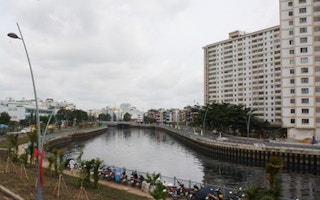The first phase of the rehabilitation of Nhieu Loc Thi Nghe Canal and the construction and expansion of Truong Sa and Hoang Sa streets, which run along the canal, has been completed after many years.
The event marks a significant milestone in restoring and upgrading the canal, considered the city’s most polluted canal for the last 20 years, according to Le Hoang Quan, chairman of the HCM City People’s Committee.
Speaking at the inauguration ceremony of the project, which was attended by President Truong Tan Sang, in HCM City on Saturday, Quan said the Project on Environment Hygiene at Nhieu Loc Thi Nghe Canal was one of the city’s first large-scale environmental projects to play an essential role in the city’s political and socio-economic development.
Quan said the project helped reduce flooding and increase sanitation at the canal, benefiting more than 1.2 million residents in seven districts. It also helped make the city more beautiful and attract more foreign investors and visitors to the country.
The first phase of the project, which started in 2003, has an investment of VND8.6 trillion (US$412.7 million), of which VND6.126 trillion ($293.94 million) comes from the World Bank’s Official Development Assistance (ODA) and VND3.348 trillion ($160.6 million) from the city budget.
More than VND1.6 trillion ($76.8 million) has been used for site clearance work and compensation for about 7,000 households that had to be relocated.
The first phase of the project aims to ensure that the drainage system at the canal operates properly to prevent flooding and that household wastewater is properly treated to prevent polluting the canal.
After more than 10 years of development, the project has resulted in more than 9 kilometres of water inlet sluice with diameter of 2.5-3 metres, dredged about 1,100,000 cubic metres of soil on the canal, and upgraded 16 bridges along the canal, among other works.
In addition, the city also invested in upgrading and expanding the two streets along the canal, Truong Sa and Hoang Sa, with an investment of VND400 billion ($19.2 million). The total length of the streets is 15.7 kilometres (Truong Sa is 8.3 kilometres long and Hoang Sa, 7.4 kilometres).
The streets have been upgraded and expanded to 16 metres wide, with more space saved for pavement and green zone (trees and flowers are planted on the pavement along the canal).
The project to upgrade Hoang Sa and Truong Sa streets has two phases.
The first phase (from the beginning of the canal at one end of Ut Tich Street in Tan Binh District to Le Van Sy Bridge in District 3) began in September 2010 and opened to traffic in December 2011.
The second phase (from Le Van Sy Street to the end of the canal on Nguyen Huu Canh Street in District 1) began on December 2011 and opened to traffic last Saturday on the opening ceremony day.
Victoria Kwakwa, country director, World Bank Office in Viet Nam, said that “the World Bank always stands committed to its continued partnership with HCM City.”
“We will move forward with preparing the second phase of the project to treat the wastewater collected in the first phase,” she said.
The Nhieu Loc Thi Nghe Canal is about 33.2sq.km and goes through seven districts: 1, 3, 10, Phu Nhuan, Tan Binh, Go Vap and Binh Thanh. These districts include more than 1.2 million residents living near the canal which has been seriously polluted for many years.
Household water used to be discharged directly into the canal without being treated. Meanwhile the drainage system was seriously degraded, causing flooding for many years.
Nguyen Thanh Suong, a 75-year-old resident in District 3, who has been living near Nhieu Loc Thi Nghe canal for nearly 20 years, said thanks to the project the canal has now improved significantly after nearly 20 years of being seriously polluted.
“The canal has now become a park for everyone. I am very pleased because residents living near here can go to the canal for exercise everyday,” he said.










